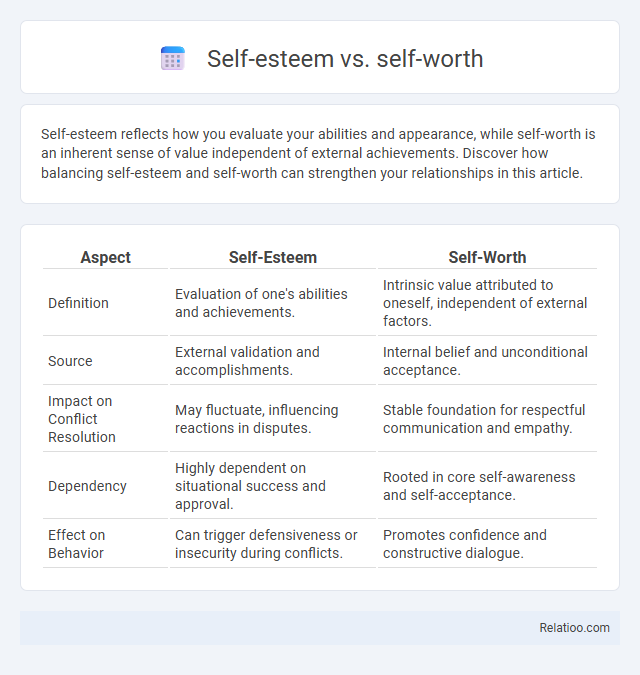Self-esteem reflects how you evaluate your abilities and appearance, while self-worth is an inherent sense of value independent of external achievements. Discover how balancing self-esteem and self-worth can strengthen your relationships in this article.
Table of Comparison
| Aspect | Self-Esteem | Self-Worth |
|---|---|---|
| Definition | Evaluation of one's abilities and achievements. | Intrinsic value attributed to oneself, independent of external factors. |
| Source | External validation and accomplishments. | Internal belief and unconditional acceptance. |
| Impact on Conflict Resolution | May fluctuate, influencing reactions in disputes. | Stable foundation for respectful communication and empathy. |
| Dependency | Highly dependent on situational success and approval. | Rooted in core self-awareness and self-acceptance. |
| Effect on Behavior | Can trigger defensiveness or insecurity during conflicts. | Promotes confidence and constructive dialogue. |
Understanding Self-Esteem: Definition and Core Concepts
Understanding self-esteem involves recognizing it as the subjective evaluation of your own worth, reflecting confidence in your abilities and self-respect. It differs from self-worth, which is a deeper sense of intrinsic value, and self-confidence, which pertains specifically to trust in your skills or judgments. Building a healthy self-esteem requires nurturing positive self-perceptions and acknowledging both strengths and limitations.
What is Self-Worth? A Foundational Perspective
Self-worth represents an individual's intrinsic value and sense of being inherently deserving of respect and love, independent of external achievements or opinions. Unlike self-esteem, which often fluctuates based on specific successes or failures, self-worth is a deeper, more stable foundation underpinning emotional well-being. Recognizing self-worth fosters resilience and authentic self-acceptance, crucial for mental health and personal growth.
Key Differences Between Self-Esteem and Self-Worth
Self-esteem refers to the evaluation of one's own abilities and characteristics, often influenced by external achievements and comparisons. Self-worth is an intrinsic sense of value that remains stable regardless of success or failure, rooted in the belief that one is inherently deserving of respect and love. The key difference lies in self-esteem being conditional and fluctuating, while self-worth is unconditional and constant.
How Self-Esteem Develops: Influencing Factors
Self-esteem develops through a combination of early childhood experiences, social interactions, and feedback from significant others such as parents, teachers, and peers. Key influencing factors include accomplishments that build competence, consistent emotional support fostering security, and exposure to positive role models reinforcing personal value. Neurobiological aspects, such as brain areas related to self-processing, also contribute to the dynamic formation of self-esteem over time.
Origins and Sources of Self-Worth
Self-worth originates primarily from intrinsic factors such as personal values, self-acceptance, and a stable sense of identity, distinguishing it from self-esteem which often depends on external validation and achievements. Psychological research emphasizes that self-worth is deeply rooted in an individual's internal belief system and resilience, providing a more enduring and unconditional foundation than self-esteem. Understanding the origins of self-worth involves exploring early childhood experiences, secure attachments, and consistent positive reinforcement that foster a sense of inherent value.
The Role of External Validation in Self-Esteem and Self-Worth
Self-esteem often relies heavily on external validation, making it susceptible to fluctuations based on others' opinions, while self-worth is generally more intrinsic and less dependent on outside approval. Your self-worth reflects a deep-seated sense of value that remains stable regardless of external feedback, whereas self-esteem can increase or decrease depending on social recognition or criticism. Understanding this distinction helps you cultivate a stronger, more resilient sense of identity that isn't easily swayed by external judgments.
Impact on Mental Health: Self-Esteem vs. Self-Worth
Self-esteem refers to your overall evaluation of yourself based on abilities and achievements, while self-worth is an intrinsic sense of value independent of external factors. High self-worth fosters resilience and stable mental health by providing a consistent foundation of self-acceptance, whereas self-esteem fluctuations can lead to anxiety or depression due to its reliance on external validation. Prioritizing self-worth over self-esteem cultivates lasting emotional well-being and reduces vulnerability to stress and negative mental health outcomes.
Building Healthy Self-Esteem: Practical Strategies
Building healthy self-esteem involves recognizing your intrinsic value beyond external achievements and focusing on self-acceptance and resilience. Practical strategies include setting realistic goals, practicing positive self-talk, and surrounding yourself with supportive people who reinforce your sense of worth. Prioritizing these actions helps you develop a balanced self-view, strengthening both self-esteem and self-worth.
Cultivating Unshakeable Self-Worth
Cultivating unshakeable self-worth involves recognizing intrinsic value beyond external achievements or approval, distinguishing it clearly from self-esteem which often relies on success or social validation. True self-worth is an internal compass anchored in self-acceptance, resilience, and respect, fostering mental well-being and empowering consistent confidence. Prioritizing self-worth development reduces vulnerability to fluctuations in self-esteem and promotes a stable, authentic sense of identity.
Choosing Self-Worth Over Self-Esteem: A Path to Fulfillment
Choosing self-worth over self-esteem fosters a deeper sense of intrinsic value independent of external achievements or validation, leading to sustained fulfillment. While self-esteem fluctuates based on success or failure, self-worth remains constant because it is rooted in the acceptance of oneself as inherently valuable. Emphasizing self-worth encourages resilience and authentic growth, which ultimately supports long-term emotional well-being and personal fulfillment.

Infographic: Self-esteem vs Self-worth
 relatioo.com
relatioo.com